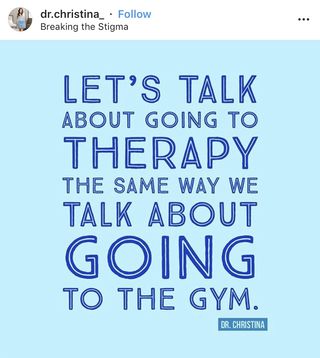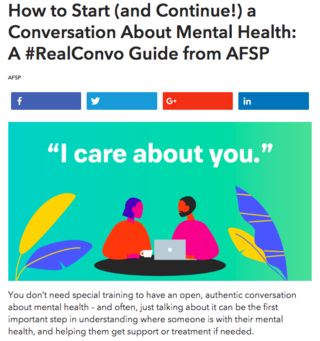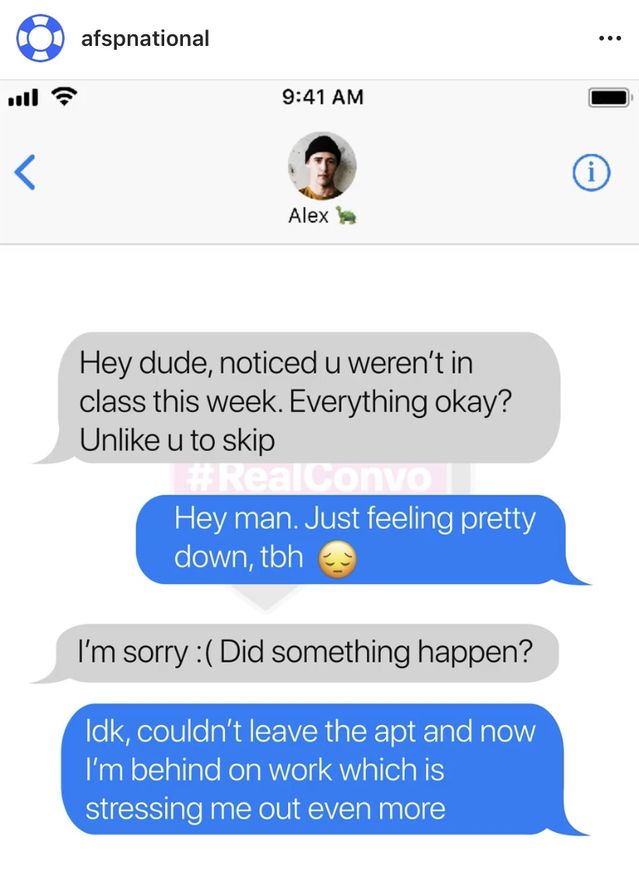Health
How to Have a #RealConvo About Mental Health
Hint: It doesn't even have to involve a lot of talking.
Posted May 28, 2019
“I’m that person who goes out to dinner and talks about therapy,” I laughed to a friend the other night, just as I was about to launch into a, “My therapist said…” story. Because my work involves mental health, I’m very comfortable talking about therapy (probably to a fault!) and when I saw this image on Instagram, it felt like a good fit:

“Let’s talk about going to therapy the same way we talk about going to the gym.”
We brag about going to the gym. We joke about not going to the gym. But, talking about mental health is hidden. We do it with mental health practitioners, who are accustomed to hearing people’s deepest and darkest. But, we don’t do it as well with each other. We shut ourselves down and shut others out, keeping quiet about the very things about which it could be meaningful, even life-saving, to connect with others.
For May, Mental Health Awareness Month, a number of organizations traditionally launch campaigns to help people talk more about mental health. In the time of all things social, campaigns are spreading even farther by engaging social media as a tool.
The American Foundation for Suicide Prevention (AFSP) launched its campaign to encourage people to talk about mental health via Instagram.
In early May, their grid takeover featured nine people’s stories, each “taking a stand against the concept that social media is only a place for posting your perfect highlights – that instead, it can be a place for authentic moments,” according to AFSP.
At the same time, AFSP featured ideas for how to start – and continue – real conversations about mental health, both via Instagram and through companion articles on their website.

What are some ways to do this?
To let someone know you’re open to hearing about their mental health struggles: “I’ve had times in my life when I’ve struggled. I went to talk to someone, and it really helped me.”
To let someone know that you’ve noticed there might be something going on for them: “I care about you and I’ve noticed you haven’t been yourself lately. I’m wondering how you’re doing.”
To let someone know you’re there for them: “Whatever it is, I’m here to listen and support you.”
One thing that’s great about AFSP’s piece is that it acknowledges that all of this is hard, and often imperfect. What if you miss the perfect chance to say something? Say something later.
“The other day I noticed that you seemed upset. I’m really concerned about how you’re doing.”
And, the way to approach talking doesn’t even have to involve a lot of talking. It can just be being together:
“Would you like to go for a walk?”
“Can we grab coffee?”
It is common, when struggling, to perceive that others might not want to hear about your problems. And, it can be hard to articulately express what you’re feeling and thinking. Give permission for someone to be real, letting them know that you are okay hearing about it and that they’re not too much.
AFSP has created guides for what to do if someone tells you they’re thinking about suicide, how to talk to someone who has lost a loved one to suicide, and how to reach out for help if you’re struggling. Each of the guides uses plain language and offers simple ways to begin and continue conversations.
I love that the conversations don’t have to be in person, face to face – this is often what feels so hard. AFSP gives a great example of how to have a text conversation to check in.

That is not to say that any of this is simple. It is complex to have feelings that lead you to think you might need help, and challenging to overcome the fear, stigma, and worry that maintain silence. It is hard to hear when someone we care about is going through something hard, especially if there isn’t an easy fix. It can be devastating to learn that a friend has lost someone to suicide and it can feel impossible to know what to say.
But, what I like about AFSP’s campaign and others like it is that they represent an effort to demystify the hard conversations that are happening behind closed doors all the time, shining light on good ways to be good to each other, and teach a broader audience how to make mental health a part of our everyday lives. Just like we open Instagram (a million times a day!) to look at what our friends are doing, our favorite products, or beautiful photos, we can open it to take care of ourselves and of each other.
On Instagram, search for #RealConvo or go to @afspnational for more ideas and to see the grid takeover.
Copyright 2019 Elana Premack Sandler, All Rights Reserved




